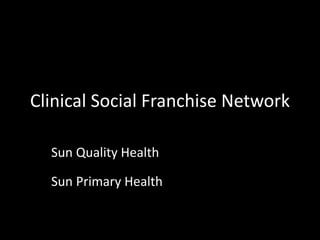franchising
- 1. Clinical Social Franchise Network Sun Quality Health Sun Primary Health
- 2. Social Franchising âĶâĶis defined as a system of contractual relationships âusually run by a non-governmental organization which uses the structure of a commercial franchise to achieve social goalsâ Montagu, 2002
- 3. PSI/Mâs Social franchise: Sun Quality Health FranchiseeFranchiser Branding Training Standards Commodities Following the standards Scale, Quality, Equity & Cost-effectivenessGoals: (Since 2001) INGO Private clinicians
- 4. Two-tiered franchise 2001 2008 Sun Quality Health Sun Primary Health 1st tier 2nd tier In Urban/slum In rural
- 5. The Franchise coverage in a township + + hospital RHC v v Sun Primary
- 6. Operator owned branded clinic Payment by clients who receive the services 3 features of the network Standardized Services at all Franchised outlets
- 7. Fractional Franchise Services offered Aches, pain, headache Cut, abrasion Stomach problems Fever, cough Fever with rigor Diarrheal diseases Family planning STIs Hypertension TB, pneumonia Malaria ORS+Zinc Contraceptives Genital discharge Franchised services HIV test/counseling
- 8. Operational management Technical unit Operation unit Overseeing Health programs Trainings to providers Technical support Field monitoring Expansion of new providers Product sales Health Services Department Health promotion
- 9. Regional operational management Regional manager Sr field officer 1 field officer 2 Jr field officers 4-5 field supervisors >120 SQH clinics in urban/peri-urban >150 SPH providers in rural areas to serve 2-5 million population Each team led by Sr FO manages: Sr field officer 1 field officer 2 Jr field officers 4-5 field supervisors
- 10. Products distributed through SUN channels Program Product OK pills OK 3 month OK EC OK condom OK FC OK IUD Pregnancy test Cure U (urethritis) Cure U (ulcer) Cure U (Vaginitis) d4T+3TC+NVP Determine HIV test UniGold HIV test Supa Tab RDT Coartem I Coartem II Coartem III Coartem IV Cat I Cat II Cat III Pneumox 125 Pneumox 250 No. of Product 7 6 6 3 2 A total of 25products Orasal 1 RH STIs/HIV Malaria TB Pneumonia Diarrhea
- 11. The networksâ achievement in 2011 RH: family planning Malaria STIs Pneumonia Tuberculosis HIV test/counseling Number of people served
- 12. Health impact Program effectiveness Quality Equity Access Efficiency Provider given better services Poor users are given preference More users are able to reach services Program achieves Q-E-A cost effectively Quality standards Provider Behavior change Voucher Pricing Patient incentives â channels â providers â integration â low performers Incentives Integration Activities Output Purpose Goal HS framework
- 13. Thanks
Editor's Notes
- #7: Outlets are operator-owned Payments to outlets are based on services provided, although the mechanism of payment may vary and may include client out-of-pocket, voucher, third party insurance or other systems Franchised services are standardized, although additional, non-franchised products and services may also be offered Clinical services are offered, with or without franchise-branded commodities













